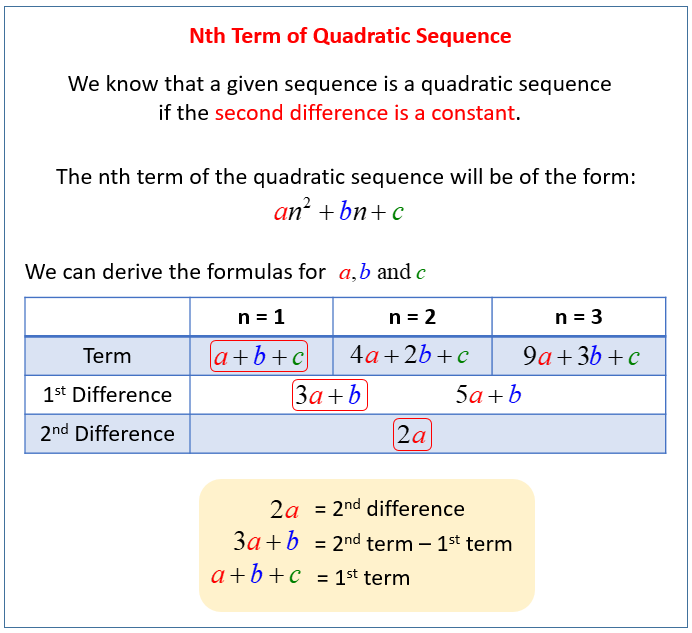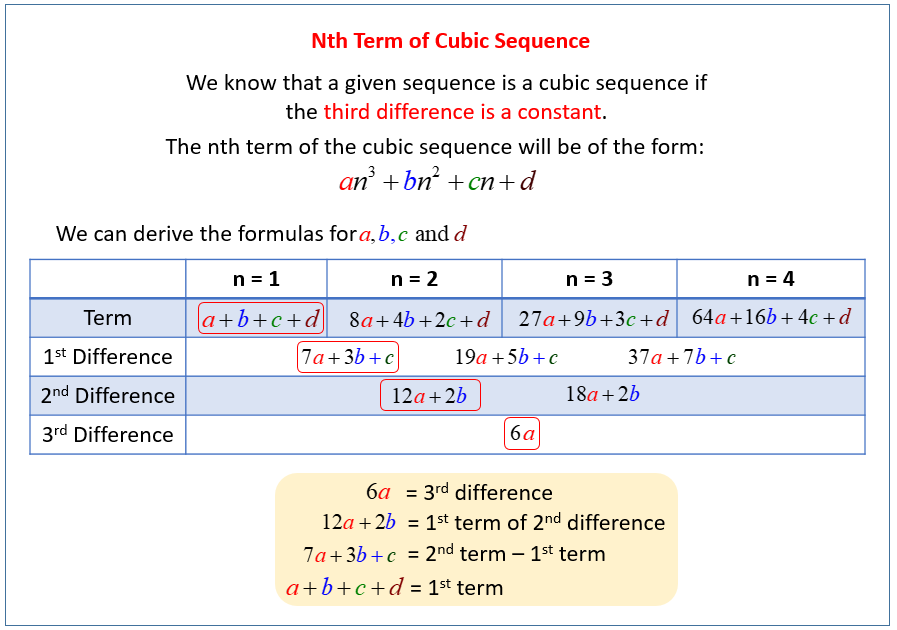
cubic sequence YouTube
Cubic Sequences, how to find the formula for the n-th term, using the difference method.Cubic sequences of numbers are characterized by the fact that the thi.

Find the nth Term of a cubic sequence IGCSE Maths Grade 9 Year 10
Since the first differences are the same, this means that the rule is a linear polynomial, something of the form y = an + b. I will plug in the first couple of values from the sequence, and solve for the coefficients of the polynomial: 1 a + b = 5. 2 a + b = 7. This system solves as: So the formula is y = 2n + 3.

Cubic Sequences How to find the formula for the nth term YouTube
A cubic number is a figurate number of the form with a positive integer. The first few are 1, 8, 27, 64, 125, 216, 343,. (OEIS A000578 ). The protagonist Christopher in the novel The Curious Incident of the Dog in the Night-Time recites the cubic numbers to calm himself and prevent himself from wanting to hit someone (Haddon 2003, p. 213).

Cubic Sequences Worksheet 1 Hypertext
In mathematics, we use the word sequence to refer to an ordered set of numbers, i.e., a set of numbers that "occur one after the other.''. For instance, the numbers 2, 4, 6, 8,., form a sequence. The order is important. 8.2: Infinite Series. This section introduces us to series and defined a few special types of series whose convergence.

How To Find The Nth Term Of A Cubic Sequence How to find the general
Quadratic And Cubic Sequences A series of free, online lessons suitable for GCSE Maths, with videos, examples and solutions. These lessons cover quadratic sequences and cubic sequences. Share this page to Google Classroom Related Pages Number Sequences Arithmetic Sequences Geometric Sequences Lessons for GCSE/IGCSE Maths

Cubic Sequences Exercise question 1 YouTube
Level 4 - Quadratic sequence problem solving. Level 5 - Cubic sequences of the form an 3 + bn 2 + cn + d. Exam Style questions are in the style of GCSE exam paper questions and worked solutions are available for Transum subscribers. Handshakes - Try this lesson Starter which can generate a quadratic number sequence.

Cubic Sequences YouTube
Cubic Sequences (Difference Method for the nth n th term) Cubic sequences are characterized by the fact that the third difference between its terms is constant. For example, consider the sequence : 4, 14, 40, 88, 164,. 4, 14, 40, 88, 164,. looking at the first, second and third difference of this sequence would look like :

Cubic Sequences Exercise question 4 YouTube
S n = 2n(n+1). Find the sum of the first 100 100 positive integers. Plugging n=100 n = 100 in our equation, 1+2+3+4+\dots + 100 = \frac {100 (101)} {2} = \frac {10100} {2}, 1+ 2+3+4 +⋯+ 100 = 2100(101) = 210100, which implies our final answer is 5050. _\square . Show that the sum of the first n n positive odd integers is n^2. n2.

Quadratic and Cubic Sequences (solutions, examples, videos, worksheets
Cubic Sequences Worksheet 1 Try answering each of the following without a calculator. Show all of your working and state any formula used. Click on the link in the Header of this page, or scan the QR Code to view the online notes and tutorial(s) for this worksheet. Exercise 1

8.5 Cubic sequences YouTube
Find the nth (general) term of a cubic sequence by using a method of differences. Made with an applet on waldomaths.com

Cubic Sequences How To Find Out The First 3 Numbers Of The Sequence
The cubic formula is the closed-form solution for a cubic equation, i.e., the roots of a cubic polynomial . A general cubic equation is of the form (1) (the coefficient of may be taken as 1 without loss of generality by dividing the entire equation through by ).

Cubic Sequences Exercise question 3 YouTube
1 {22, 15, 10, 7, 6, 7, . . . } A) . 8 sequence. Finally, find t cubic, or neither. Then find the equation of each Determine if each sequence is arithmetic, quadratic, Example: + cn + d 2 + bn 3 Its equation has the form tn = an • Common Difference occurs at D3 • A Cubic Sequence Cubic Sequences Section 1.5:

How To Find The Nth Term Of A Cubic Sequence How to find the general
Cubic Sequences To find the n th term of a cubic sequence we will need to find the first, second and third differences. Similar to a quadratic sequence you then subtract an^3 from your original sequence, leaving you with a quadratic sequence, where you then follow the same steps as above to find the n th term. Example:

Cubic SequenceFinding the nth Term Formula YouTube
Back In this lesson, we will investigate how terms change when a sequence is quadratic. In other words, it is of the form ax² + bx + c. We will also investigate cubic sequences.

Finding the general expression of cubic sequences YouTube
(a) Find the next three terms. Looking at the difference between the terms, we see that they are all 2. So this is a linear sequence with common difference 2 So the next three terms are 13 + 2 = 15 15 + 2 = 17

Quadratic and Cubic Sequences (solutions, examples, videos, worksheets
Cubic Sequences - Finding the nth Term Formula Kawthar Ali 2.27K subscribers Subscribe Subscribed 22K views 3 years ago IGCSE Extended Going through the process of finding the nth term formula.